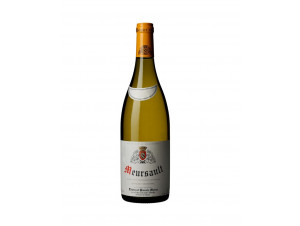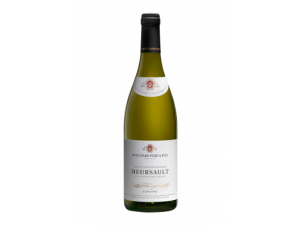You have no items in your shopping cart.
Wine Meursault
The Meursault appellation is one of the stars of the Côte d'Or. Particularly renowned for its white wines, the appellation also produces red wines. The area under production, exclusively located in the commune of Meursault, is equivalent to 400 hectares, of which more than 95% is dedicated to the cultivation of Chardonnay. Read more on Meursault
-
Top Selling
-
Top Selling
-
Top Selling
- -25%
Appellation Meursault
The Meursault vineyard dates back to antiquity
Viticulture developed on the Côte de Beaune as early as antiquity. Remains from the Gallo-Roman period provide evidence of wine production at that time. In the Middle Ages, the spread of Christianity accelerated the wine development of the Burgundy region, particularly under the influence of the Abbey of Citeaux. From the 17th century onwards, the development of trade and, among other things, easier access to the Parisian market will enable the vineyard of the Côte de Beaune to structure itself. Trading and merchant houses were set up to promote local production.
The end of the 19th century was marked by numerous diseases of thevine which caused the vineyard to suffer. After having faced Oidium and then Mildew, the vineyard of Meursault is one of the very first to be affected by Phylloxera. This one will ravage the vineyard and push part of the profession to abandon. However, the vineyard will gradually be restructured with the appearance of resistant grafted plants, the evolution of cultivation practices and the evolution of the delimitation of planted areas.
In 1937, the protected appellation of origin Meursault was created.
What are the characteristics of the Meursault vineyard?
The town of Meursault is the central point of the Côte de Beaune. This appellation is surrounded by the communes of Volnay, Monthélie, Puligny-Montrachet and Auxey-Duresses. The Meursault vineyard is located on the hillside, on gentle slopes facing east. The soils date from the Jurassic period and are mainly composed of limestone marl. The limestone contained in the subsoils allows the production of precise and absolutely exquisite white wines.
Meursault benefits from a temperate climatology with cold winters and hot summers, all of which is relatively well balanced. The rainfall rate is relatively favourable to the culture of the grape. The Meursault appellation is no exception to the Burgundy rule of climates and has no less than 19 climates classified as 1er Cru.
Chardonnay is the undisputed grape variety of the AOC Meursault
It is no longer a mystery, the fabulous white wine of Meursault is made from the grape "Chardonnay". To this, thePinot Blanc is sometimes added. But, as the commune produces a small amount of red wine, the winegrowers also cultivate the "Pinot Noir".
The AOC-AOP Meursault is authorised to provide an average yield of 5,838 hectolitres of wine per year, or 40 hectolitres per hectare of red wine and 45 hectolitres per hectare of white wine. In total, this appellation d'origine contrôlée produces an average of 19,000 hectolitres of wine per year. The Meursault vineyard covers an area of about 400 hectares; 105 hectares of which are Premiers Crus.
The AOC Meursault produces unique wines on the Côte de Beaune
Meursault blanc offers characteristics unique to white wines made from Chardonnay. Its colour is widely recognisable, golden with green, even grey reflections. With age, its hue can become deeper, revealing a "bronze gold" or amber colour. Its colour is limpid and brilliant, more or less shaded according to its age.
Its solar bouquet and freshness, make Meursault wine one of the most prestigious and incomparable white wines in the world. It is the only one to offer this delicious and subtle nutty flavour, in addition to an incredible smoothness in the mouth. This sugar-free smoothness is absolutely unique, and made possible by the natural glycerin in the wine.
The nose is rich, floral and vegetal, but also enhanced by mineral scent, such as flint. This dry white wine dazzles the senses with the diversity of its aromas. On the palate, it is rich, greedy and fat. One perceives aromas such as: hawthorn and fern, apricot, lemon, mirabelle plum, honey, truffle, toasted bread.
To reveal this aromatic intensity, the white wine of Meursault needs maturity. It is an excellent wine for laying down, even surpassing some red wines in longevity in its best years. As for the dry red Meursault wines, they reveal fruit of great finesse. They are wines with a heavy, masculine character and a high tannin content.
What are the great vintages of Meursault?
These two types of wine have a potential for ageing that is very interesting. For the red, it varies between 5 and 10 years of age. But for the white, it is between 8 and 15 years; and can go well beyond! Meursault offers incredible millésimes and is much sought after by wine lovers around the world.
With which dish to enjoy a Meursault?
Meursault wines can be enjoyed with all kinds of sauces! They go just as well with grilled or roasted red meat, as with fish or seafood. And finally, they are absolutely delicious with dessert...
The remarkable domains of the Meursault appellation
The Maison Henri Boillot
This is a family estate steeped in history and deeply rooted in its territory. Founded in 1885 by Henri Boillot's grandfather, the estate gradually expanded while retaining its values: the transmission of a heritage, know-how and memory, and of course an immense respect for nature. Henri Boillot is one of the defenders of a viticulture that respects its environment.Laurent Boussey Estate
Laurent Boussey represents the 5th generation of his family to lead the vines of the estate. With know-how handed down from generation to generation, he produces wines of great purity as a family, respecting the environment with a reasoned cultivation practice.
Bourgogne appellations






























 TWIL - Achat de Vin
TWIL - Achat de Vin


